
Back in December, we published an exclusive dev diary about El Somni Quas, an indie sandbox from a Czech studio that actually cut its teeth on Ultima Online emulators and plans to port a lot of the ideas it tested there into its built-from-scratch 3-D venture. Today, we have another deep-dive into the game’s plans, including at outline of its races and classes, a brief look at its housing and dungeons, and the philosophy undergirding its free-for-all PvP system.
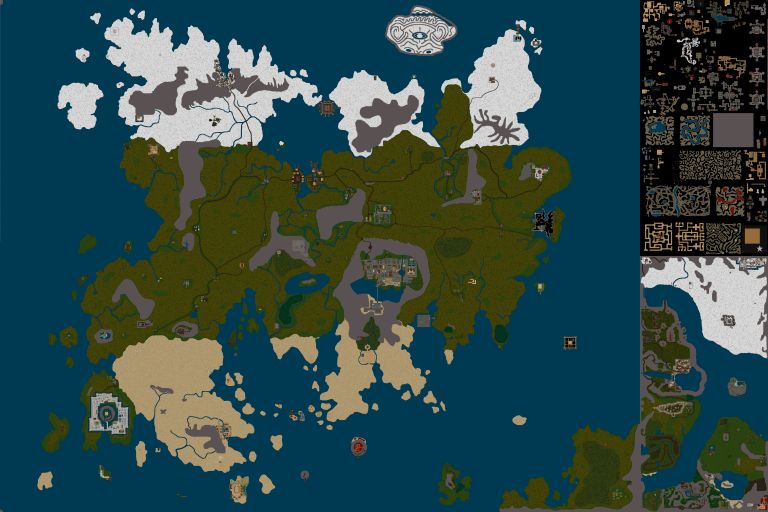
So why go back to the old principles, when ever since ’97 when Ultima Online appeared in this world there has been a long list of newer MMO with a wide variety of gaming systems? Because of their simplicity and rawness, which at the end will make it possible to naturally blend in with the world, in which they are going to live as a gaming avatar.
We are doing ESQ mainly for us and other likeminded people, just because we have nothing to play. We find it difficult to identify with the vast majority of today’s gaming worlds, where we can’t hit anyone, because you just can’t, or because he fights for the same race, or he’s just in your team. It’s not really believable for us, that a person that you defeat in a more or less honorable way cannot be robbed of all of his possessions and have the rest of his limbs spread across the world.
These principles are not just self-serving; the whole world is literally built on them, and this is what creates long playability. They enable gamers to create their own history and submerge in to it so deep that no themepark will ever make anything like that possible.
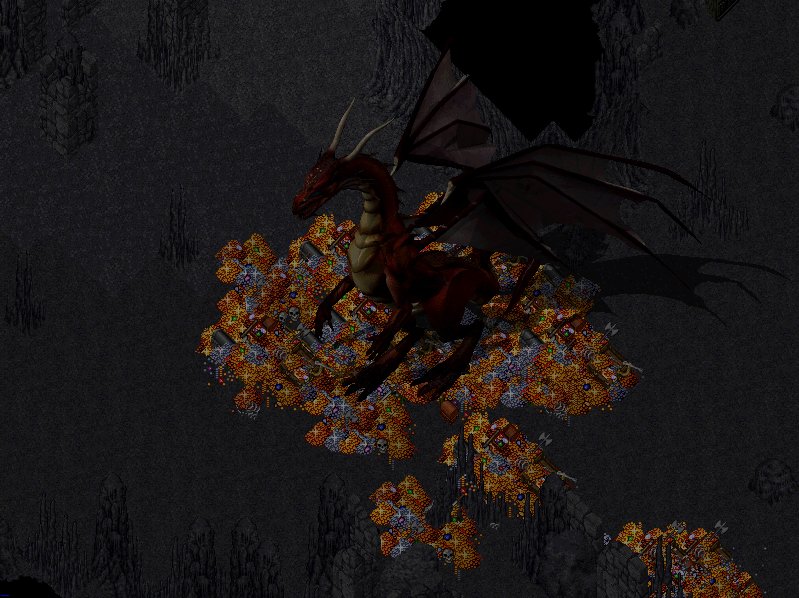
The ability to start a guild and make them into elite PvP fighters, then beat the crap out of the losers from the next village, you literally stomp them into ground. This is difficult to compensate even with a well scripted quest. The choice of playing either really good or really evil character, that can really make life difficult can’t be replaced by an artificial choice between Horde and Alliance. Most of all, today’s games basically don’t allow the gamer to make a mistake and pay for it. What kind of a mistake can you make in a game where you a have no-drop armor, no-drop weapon, where all you need to use a deadly spell is forever regenerating mana and where you have an immortal horse? Your task is going to be killing x monsters which are going to be pointed out by an arrow. So you follow: A few times you die along the way and then you finally reach your “deserved” reward.
That’s just nothing for us. We want a world, where we can set our own goals according to the understanding of the world, bank where we will pick an armor from our favorite blacksmith that we are willing to risk and leave the town not knowing what can happen. Maybe we will come back richer or on foot in just underpants.
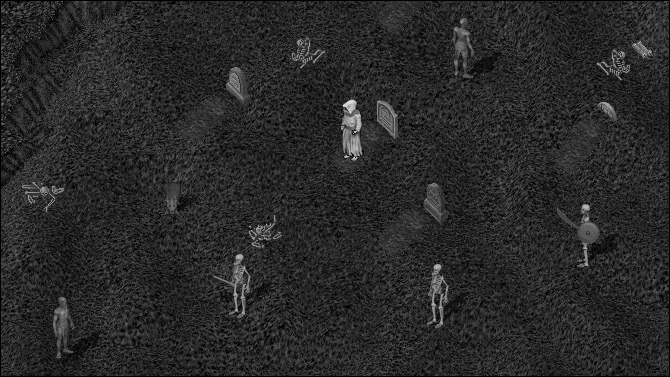
We do understand that a world like that is hard and not to everyone’s taste. Still, there is no need to give up if you are not a hardcore PvP player. We know the risk of such system and really don’t want to end up with an empty world, which will serve only as a PvP arena for PvP elite. It’s important to us to balance PvP with PvE; we want a world which is as good for crafts as for treasure hunters in deep dungeons as well as rich crafts and their apprentices. Although, we want to get to this points with natural means like penalties for murders, guarded roads, timed levers from entrances to dungeons and not unnatural restrictions like ‘behind this point you are untouchable’.
All of this is in regards to why Ultima, why Endor. The advantage of not building the game from scratch, but having a system that has been tried for years, is enormous. Just for comparison, World of Warcraft was launched in 2004. We don’t have to just search in the dark, create professions, magic nothing like that. All we have to do is imprint the world of Endor in the 3-D world ESQ and we are closer every day.
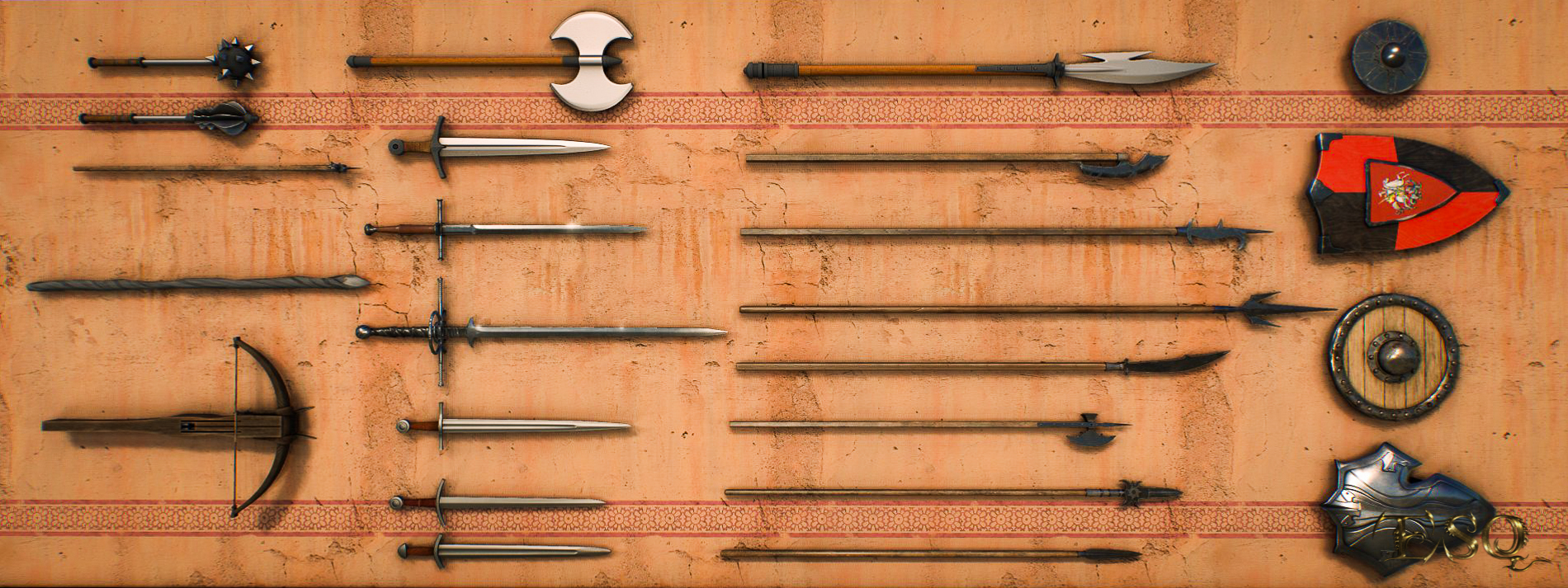
The ESQ system
ESQ is based on class/race exp/level system with skills restricted by the level of the avatar. That means that every class has its own skill set with level limits. Skills are improved by the frequency of their usage but are still limited by levels. If you were, for instance, a Mage of level 15 and reached 60 magery, you’d have to complete another level to be able to increase your magic skills to 63. Basically, you have to play; you cant just stand in a house next to a sack of reagents and skill up magery from nothing to 100.
ESQ does not have limit on maximum level but the number of experience and amount of money (game money of course) that needs to be paid to go up to another level is higher and higher. The maximum skill level can be reached quite comfortably by level 30; after that, only stats and ego see growth.
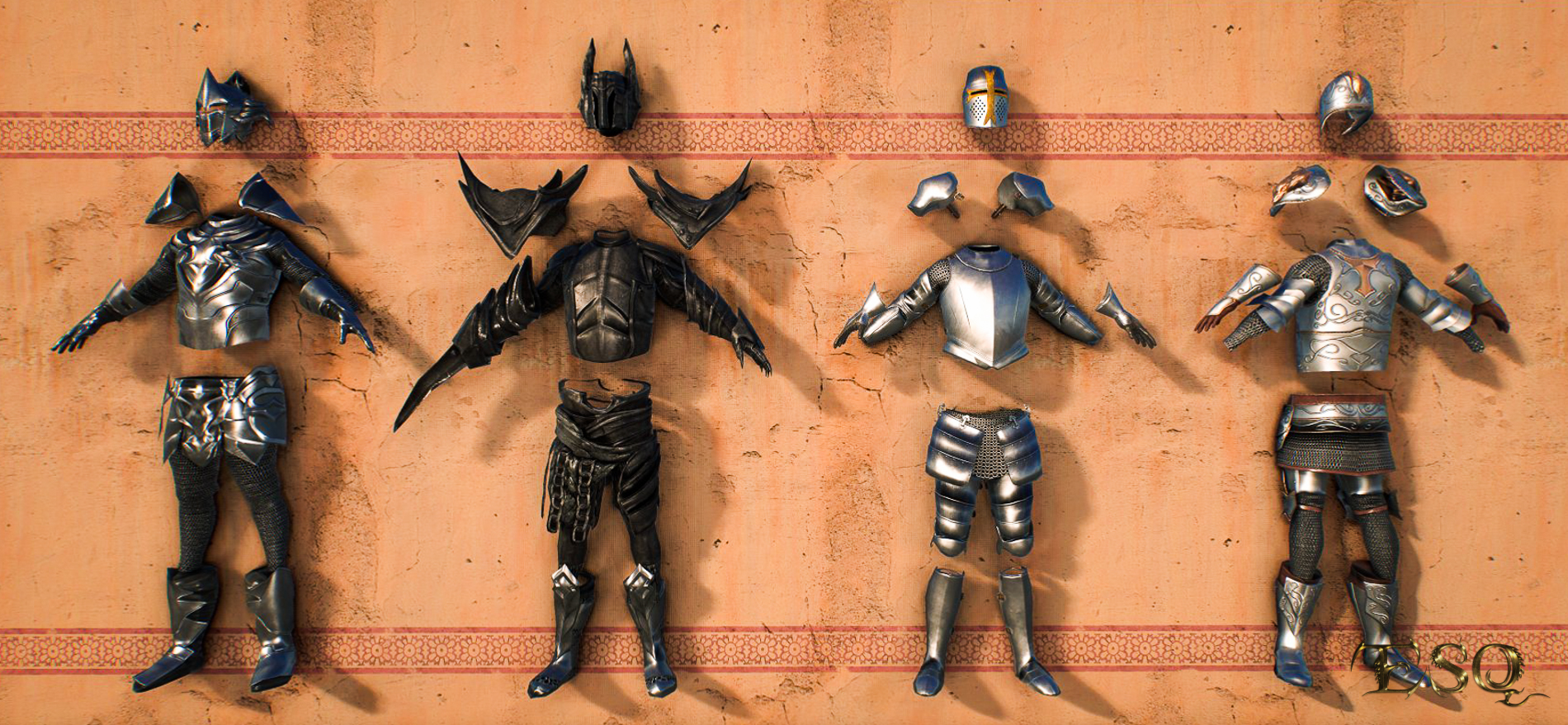
Races
Orc: By far, the strongest and sturdiest from all the races. Orcs are neither very agile or intelligent; they have a reputation of cruel primitives, but they are also undeniably brave and loyal to their clan. Orcs are great warriors and they generally avoid intellectual subjects, because they consider them to be for the weaklings.
Human: Humans are a varied race. They can become many classes, but can excel only in few of them. They are quite a strong race, though they cannot equate to the orc race. We can find many brave and dedicated human warriors who often choose the path of a paladin. On the other hand, we can find among humans also a lot of feared assassins and professional thieves. Many humans find their way to the nature and become druids and sometimes rangers; others choose a spiritual way and go to live in a monastery, to become a priest. Humans are a universal race, but concerning their agility and intelligence, they are just average. They rarely choose a pure magical class. They are more inventive than any other races, being manually skillful, and they like attend to business a lot. Human craftsmen have among others the best reputation.
Elf: A very wide-spread race, which competes in the last years with humans for the mark “universal.” In the beginning, the elves took interest mainly in magic and taking care of the woods, but they slowly have started to get in various classes and they have managed to be very successful in them. Elves aren’t as strong and tough as for example humans, but they compensate this with their famed agility quite well. Additionally, they are usually very intelligent and they have a talent for magic, so they have quite wide range of possibilities.
The traditional elven class is ranger. Among elves there are also many great mages, druids, priests and even heretics and rogues. On the contrary, true elven warriors are rarely to be seen; when an elf longs for such a way, he mostly chooses to be a druid. There are practically no elven necromancers, because elves feel aversion to such kind of magic.
Half-elf: The children of humans and elves combine and average their parents’ characteristics. Generally, half-elves are good at the same classes as both elves and humans. Thanks to elven blood, they aren’t as good as warriors as humans, and because of the human legacy, they don’t excel in higher magic like elves. Half-elf mages practically don’t exist.
Drow: Drows are a very proud and reserved race. They appreciate the intellectual skills and knowledge most and in their desire for knowing; they are free to cross every boundary. It is a race of mainly mages and necromancers, but many drows are also among heretics and priests. Drows are by far the most intelligent race. They are usually slighter and physically weaker, but quite agile.
Classes
You can choose one of 14 classes. Some of the classes can be chosen directly, while some require a pre-class. The chosen class strongly determines your character. It affects your stats and skills and adds abilities. After you get in the world of ESQ, you become automatically a Wanderer. If you want to join another class, you need to have at least the 1st level. You raise your level by gaining experience points (exps) through killing various wild animals and monsters and by completing quests. Other possibilities to gain exps are finding special items, mostly at the ends of the dungeons, which add exps when you use them (experience stones), and PK vs. blue PvP. When you have enough experience for another level, you have to visit your Classmaster and buy the level from him. The only exception is the 1st level, which is for free. As you can gain experience, you can also lose it when you die. You can also lose your level (but not stats and skills; you are also not paying for the same level twice), which will influence level-related game mechanics.
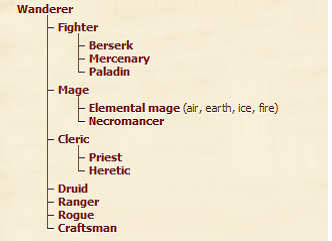
Wanderer: The first, basic class which everyone has in the beginning. The wanderers walk through the world and learn about it; they decide what they want to do in the future. They have a few basic skills, which enable them to earn their modest living and to survive in the nature. The wanderers are welcomed everywhere and they have access to all places.
Fighter: A preliminary class for those who have chosen the path of a warrior. Fighters learn the basics of close combat and they have an opportunity to try fighting with all kinds of weapons – maces, axes, swords, spears and so on. They can also try various types of armor, from heavy platemails to light chainmails, with or without a shield. Before the end of this preparation most of fighters know which specialization they will choose, and so they usually improve skills with arms and weapons typical for their future class. After finishing the 10th level, fighters have three possibilities how to continue: to became berserks, mercenaries or paladins.
Berserk: The most furious of all warriors, whose courage and verve for fight is considered by many a madness. The truth is, that berserks rush into battles often headlong, ignoring their injuries or weak armor. The typical berserks’ weapon is a two-handed axe, the bigger the better. They can launch brutal and mortal blows like no one else. Berserks do not like to wear heavy armors, which would slow them down and hinder them in combat, and hence they are more vulnerable. Also their resistance to magic is quite low – berserks rely on their devastating attack, which quickly crushes their opponent. During a fight, berserks can get to the state of the utter rage, which gives them incredible strength and speed. That time they throw away everything that slows them down. An attacking berserk is hard to stop, more than anybody else – sometimes he resists even paralyzing spells.
Mercenary: Mercenaries are well-trained soldiers, disciplined and cunning. A good mercenary must be strong, cool-headed and willing to risk his own life, when his companion is in danger. Mercenaries are trained to hold their position, even if they are far outnumbered by their enemies. Therefore a fundamental part of their equipment is a plate armor and a large shield, which they handle masterly. As a weapon they use usually various maces and in case they choose more offensive tactic, they use heavy two-handed war hammers. With a halberd in hands a mercenary is a terror to all raiders. Mercenaries are tough opponents for all warriors or for any creatures, who attack at close range. Though, they are not trained in defense against magical attacks very well. Mercenaries are used to field conditions and they can heal themselves quite well.
Paladin: Paladins are warriors, for whom the fighting is not a way how to earn their living or enjoyment, but a mission. Most of them worship some gods and fight in their name, but you can find also a few of them who don’t profess any particular god openly. However, one faith all paladins have in common: the faith that everything they do is right and necessary. That the weak and helpless ones should be protected against evil and that the dark forces should be banished from this world. Paladins are defenders who wear full plate armors and large shields, which they handle excellently, similarly to mercenaries. In contrast, they usually choose swords and spears as their weapons. For a paladin, not only his physical strength is important but also his determination, reason, valour and faith. This spiritual strength helps him in combat as the paladin uses the favor of divine forces for fullfilling his mission. He can consecrate his weapon against daemons and undeads, against whom he is an outstanding fighter. He brings light to dark places, heals poisons and diseases, he can even parry some spells with his shield. Paladins are generally rather resistant to all negative spells. Paladins are usually more educated than other warriors as many of them have spent at least some time in one of the monastery schools. They have a great knowledge in anatomy and healing and they can heal plague. It is very rare for a paladin to go astray. Such paladin then looses his connection with the mystical powers and becomes an ordinary mercenary.
Mage: A preliminary class for those who have decided to learn the most complex magic. Young mages learn the basics of magic, meditation, controlling summoned creatures and other. The mage profession is expensive and very long from the beginning not very payable. Many mages aren’t able to get through this basic school. Mages have in their repertory a few simple offensive spells, light, the simplest travel spell recall and a summoning spell, that provides them with a weak bat minion. They have to manage with this till the 10th level, when they choose their specialization. A mage can become a necromancer or an elemental mage – in that case he chooses furthermore his element (air, earth, fire, ice).
Elemental mage (air, earth, fire, ice): Elemental mages are the elite among magical classes. They master the most complicated and devastating spells, and in combat, they rely entirely on their magic. They work with pure energy, always with a certain type of element, which reflects in the character of their spells, especially the offensive ones. There are in fact four separated classes hidden under the label “Elemental mage,” each with its own classmaster and guildhall. These are air mage, earth mage, fire mage, and ice mage. Though each of them works with different element, their magic is very similar and has more or less the same results. The most notable difference lies in the kind of elemental they can summon and in the visual expression of the spells. Besides the broad range of offensive spells, elemental mages possess a few protective spells, which can be mostly invoked only on the caster. The mages don’t wear any armor, only special robes, which don’t hinder them during casting and that makes protective auras a necessity. Next, mages can summon their elemental (from the 15th level), which grows stronger with them. A very important spell is the magic barrier spell, which can stop enemies.
Necromancer: Necromancers are dark sorcerers whose magic is tightly connected with death. Similarly to the elemental mage, this is a pure magic class. They also have a few spells in common, like for example protective spells, but here the similarity ends. The necromancers are very powerful summoners, who summon undead minions. They have also their ways how to hurt and destroy their enemies directly with magic. They master a large scale of cursing and poisonous spells and additionally some damaging spells. They have also the power to bring a dead to life with the resurrection spell. The using of undead summons is a delicate art, which desires more than knowledge in magic. A necromancer can surely just summon the undeads and use them, but to employ their full potential, he can do more. The ancient necromancers discovered a way, how to boost summoned undeads. To do that, a necromancer needs a knowledge, how to use certain types of reagents. He must learn this by himself from books hidden on various cemeteries and places guarded by undead creatures. Next he needs some jewelry socketed with precious stones and a special tool necrowand, which can transfer the energy from reagents to the gems in the jewels. With these charged jewels, the necromancer can then make his minions far stronger. Necromancers don’t wear normal armors made from leather or metals, because they can’t cast in them, but they have somehow learned how to cast in bone armor successfully.
Cleric: A preliminary class. Clerics are members of various religious groups, who prepare themselves for the difficult carrier of a priest-healer. They usually don’t fight much themselves, they are rather familiar only with fight with maces, but they are sought after to smaller groups of fighters as healers. They learn from the very beginning intensively how to heal with bandages and basic boosting and protective spells. However, some of them divert from faith during this hard service and they become heretics (possible from the 7th level). Those who endure can become priests on the 10th level.
Priest: The priest class is quite different from the other combat classes. Priests try to help and fight not with weapons or damaging spells, but with healing the wounded and with casting of protective spells. It is an important and an irreplacable task and no bigger adventure can do without an experienced priest. Priests are masters in healing and anatomy. The magic they know is surprisingly complicated and they can do literally wonders with it. To the most frequently used spells belong boosting spells of all kind, wide range of protective auras and healing spells. Next, priests can with magic for example destroy enemies’ summons, magical walls and curses, they can paralyze their opponent and they possess also two minor damaging spells, mostly for PvP. Though it is unusual for priests to fight themselves, they can fight rather well with various maces. Priests learn how to cast in armor and they can wear even heavy platemails. They are very resistant to magic and this, in combination with their protective spells and with their ability to heal, makes them very tough opponents. It is almost impossible to kill a priest in a single combat, skilled priests often survive even a smaller group of attackers.
Heretic: Heretics are originally clerics but who at some point during their studies lost or radically changed their faith and diverted from their original religion entirely. Heretics excell in the summoning of various dark creatures, like for example imps or gargoyles, and the peak of their mastery is summoning of mighty daemons (from the 20th level), which they command and with whose help they fight. Heretics can throw at their enemies almost every curse known in ESQ world and they master poisonous spells as well as damaging spells. They are sought after also for their ability to replenish their companions’ mana efficiently. From their beginnings among clerics and priests, they remember a few skills. They know a few positive spells, which they use to protect themselves, they can cure a poison magically, like priests they can fight with maces and cast even in heavy armor like platemail. Heretics have brought this art to perfection and they can cast with weapons and shields in their hands. They have a basic knowledge in healing and anatomy.
Druid: Druids are guardians of ancient forests. They are usually recluse and not very friendly to those, who dare to disturb the peace on their territory. They are powerful casters as well as fighters and they are therefore widely respected. The magic of druids comes from the nature and from their relationship to living beings. They can call upon their enemies swarms of flies, moving plants, thunders, poison them or paralyze them. The protecting, boosting and healing magic of druids is wider than the offensive one. They use it mainly on their pets. Druids have an aversion to metal tools and armor and so they use only wooden weapons and leather armor. They handle namely long staves well and it is said that they can revive them and change into the shape of a snake. Druids are from all classes the closest one to the nature, wild animals don’t attack them and they can tame many of them – from wolves and bears to giant snakes and spiders. They also manage to tame common kinds of mount animals. More experienced druids can change themselves into the form of a strong and dangerous beast, with the help of a special magical crystal. They can’t cast in this state or control other animals. The most powerful druids can change even into a small dragon, with a crystal made from special components. Druids are quite capable healers and they excel especially in veterinary. They use it for healing their pets and also themselves, when morphed.
Ranger: Rangers are tough and skilled hunters, who spend a lot of time in the wilderness. They are excellent trackers and experts at animals who can tame every known mount animal and many wild beasts, though not all the kinds that druids can. Rangers’ main weapons are various bows. They can use all types of crossbows as well, but they generally use just one of them – a special cavalry crossbow, with which it is possible to shoot without any problems even when riding a horse in full scamper. It is weaker than bows, but invaluable in encounters. Rangers handle also spears quite well, but they usually avoid close combat. They wear only lighter armor, which doesn’t hinder them when shooting – chain armor or cheaper leather armor. They use various types of ammunition for shooting, which can for example pierce through protective auras of a target or through its armor. There are special lead bolts for crossbows, with which riders can be dismounted. The using of these enhanced missiles costs mana. Rangers know a few simpler spells, which make their staying in nature easier. With the help of magic, they can cover their tracks, sharpen their senses or improve their skill to move unseen and even on a mount. They know also a few supportive spells for their pets, which help them in fight. Rangers are excellent healers of animals as well as of people. Nobody knows the world as well as rangers. Many of them learn to draw maps and they can also decipher various old plans and plots.
Rogue: Rogues are a community of trained thieves and assassins, who live hidden and often on the edge of law. They can mask themselves, hide perfectly and sneak about unseen. Their home are big towns, where they find enough livelihoods. Rogues like to attack unexpectedly from behind, when they can land a terrible mortal blow with a dagger, pointed at the victim’s back. Their speciality is throwing of shurikens and knives, often smeared with a strong poison. For close combat, they use lighter swords, which they can brandish at a great speed. But in no case they match with warriors. Rogues’ smaller swords often cannot penetrate through heavier armor and the rogues’ armor itself is usually quite light – such that it doesn’t hinder them in swift moving and hiding. It is a combination of some leather armor, supplemented with smaller parts of chain or ring armor and a tiny shield – all of this only from light metals. Rogues also like to use crossbows or heavy crossbows in fight. Rogues have an irreplaceable role in a party of adventurers. Besides being very useful combatants, they are the only ones, who know how to unlock and untrap treasure chests. They can also identify most of magical items.
Craftsman: Craftsmen are a non-fighting class. They attend mostly to three activities: harvesting of materials, production and trade. One craftsman can know all harvesting and productive skills. Young craftsmen usually start with learning harvesting skills, with which they can make reserves of materials for themselves and they can make also their first money by selling part of them. These skills are mining and lumberjacking. Fishing is mostly the domain of more experienced craftsmen who have enough free time. The productive skills are the following: blacksmithy, engineering, tailoring, alchemy, tinkering and gemcutting. Except for the last one, all these skills can be learned only through a bulk order system. The bulk order system works like this: a craftsman visits various vendors, who give him orders for certain goods. The craft makes the items requested and returns the order to the vendor. By this, he increases his limit of the skill, which was necessary for fulfilling the order, and gains experience. All other skills depend on the craftsman’s level, similarly to other classes. Craftsmen are well acquainted with various merchandise and they can identify all magical items. They can also determine the exact state of armors and weapons and if they know the appropriate productive skill, they can also repair them.
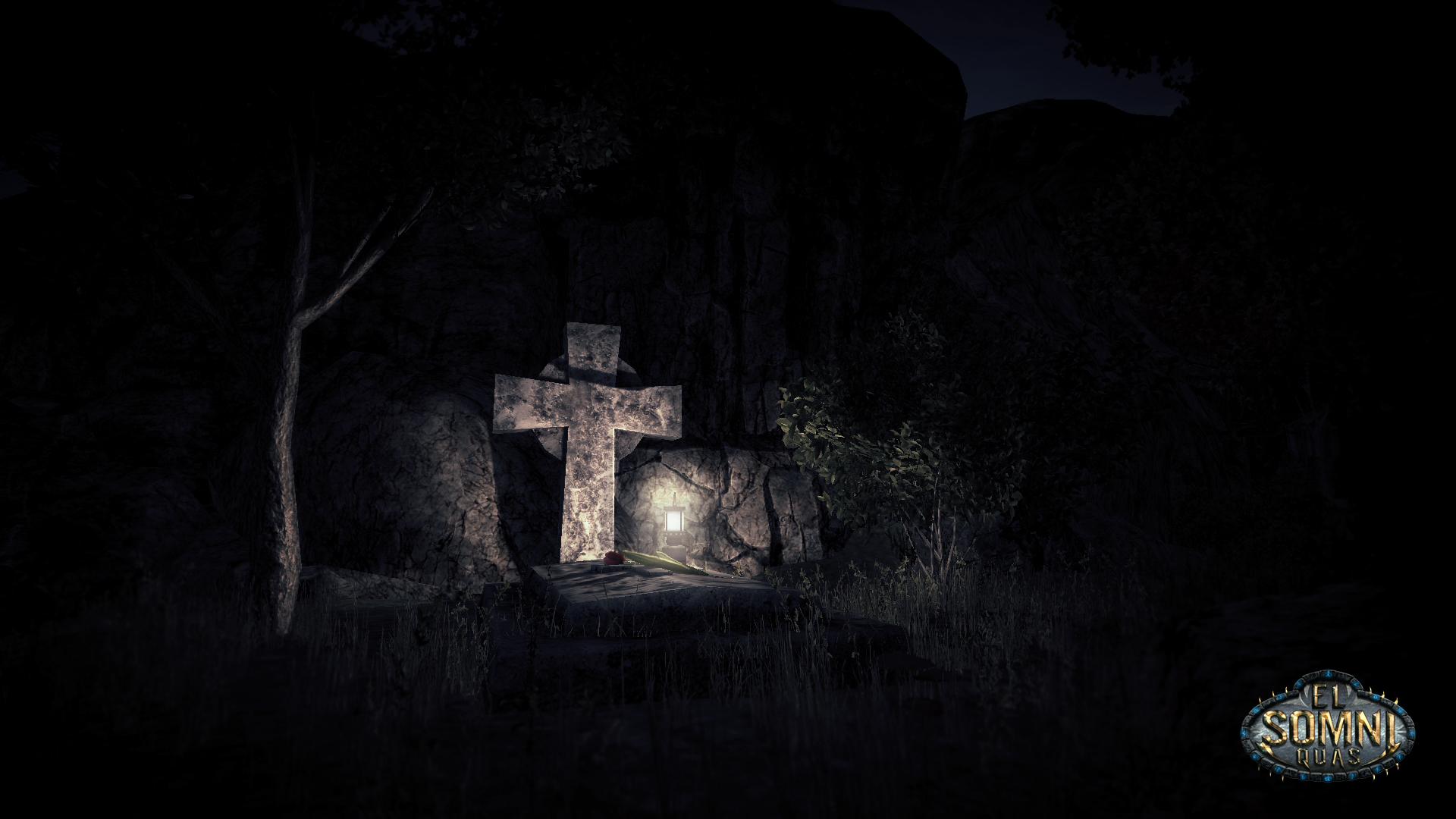
PvP
PvP system is of course free for all, you can’t expect any less from the descendant of Ultima Online. In reality you can attack anyone anywhere, even though it is not exactly practical to attack people in towns, where they are actually protected by guards. Simply the fight is going on between the blue players (with positive karma) and the red players (with negative karma). The fights are also happening in towns within the PvP league, which can be entered by anyone who’s brave enough and also as part of guild wars.
Housing
The next very important part of the system is housing. Housing is actually a very important part of the game whether it is a single player or guilds. In towns, you can rent houses and rooms in public houses, and outside of town you can actually build your own house and permanently own it. We can say we take living outside of town into consideration, but because 3D environment is more complicated than isometric, we still have to test and choose whether it is going to be possible to just place houses freely or use pre-planned network. Of course, we do anticipate gaming towns and villages.
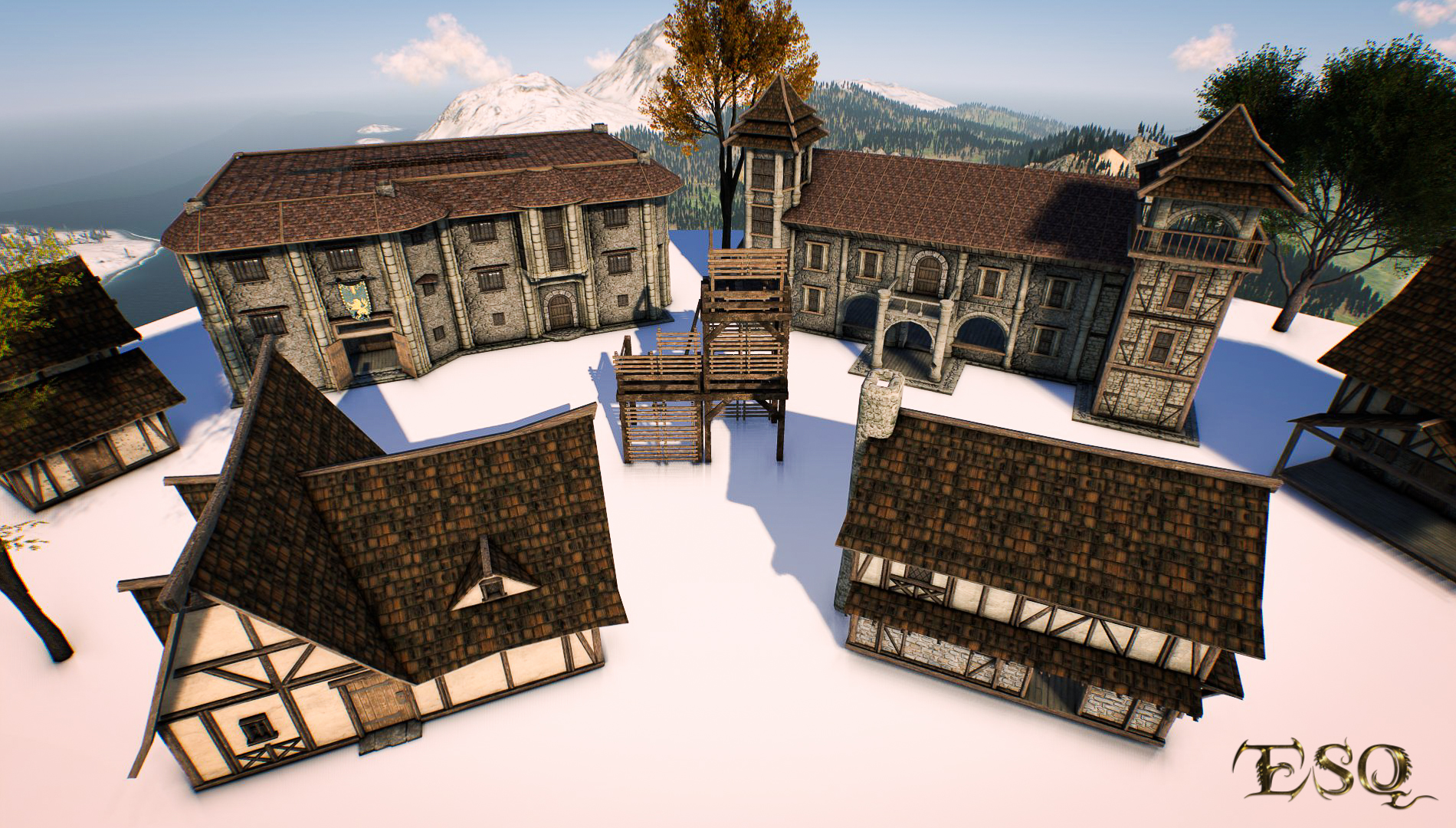
Dungeons
We absolutely love dungeons – the more, the better. From holes in a ground with few goblins, to deep tombs full of mortal danger and treasures. There are over 200 dungeons on Endor, and we have the same ambition with ESQ. At the end of the dungeons there are not only strong monsters and treasures but also you can find XP stones, rewarding adventurers with extra portion of experience.
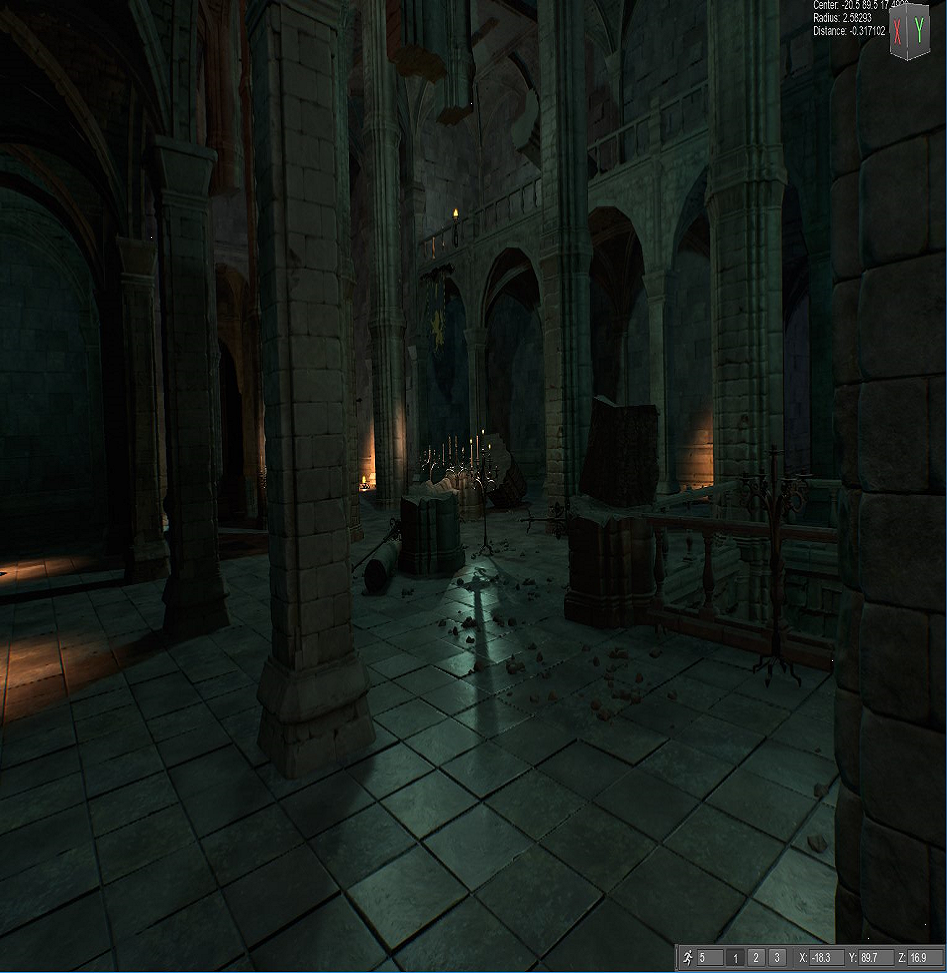
Dungeons are going to be mostly open, therefore you can meet other players, but not everyone will have good and pure intentions. Most of the dungeons are gonna be more challenging than just walking through, there will be traps and doors that need to be opened with a lever, they are timed or are linked to a spawn monster which guards it. That means that PK shouldn’t be breathing down your neck. We are also like non-linear dungeons with secret rooms, so even after several visits of the dungeon you cant be sure you discovered everything.
We’d like to thank the ESQ developers for sharing their design plans with our readers. You can read more on the official website.














